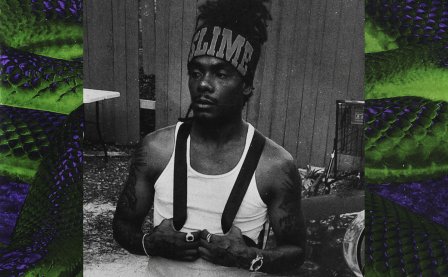Someone had to take the year; why not Lil Uzi Vert? After an impossibly quick rise to prominence in 2016, Uzi’s become the de facto big-budget feature for any artist looking to boost a prospective single or romance the legion of rap fans activated by the emergence of SoundCloud as the genre’s proving ground. In this way, Uzi stifles his competition by making himself an indispensable part of their successes. Not only is “XO Tour Llif3” the runaway favorite for the year’s defining song, but its primary rival “Magnolia” is both inconceivable in a world without Lil Uzi Vert and taken from an album with not one, but two scene-stealing features from Uzi himself.
The Uzi phenomenon isn’t a complete mystery. In a relative sense, he presents a sort of family-friendliness that his peers lack. By and large, there’s not a meaningful difference in his lyrical content, but there’s also little evidence that the Tipper Gores of the world are arbitrating decency based on actuality so much as expectation. Rather, there’s a distinction worth investigating rooted in Uzi’s perception as non-threatening: closer to five feet than six, apt to have hair of any color depending on the day, and seemingly unconcerned with any particular sartorial expectations of rappers (or men, for that matter), he’s simultaneously one of the least conventional rap stars imaginable and the natural byproduct of the genre’s long-gestating penetration of the entirety of American culture.
The optimist would see Lil Uzi Vert as merely the most visible member of his own fanbase, separated from them only by a natural charisma and a platform upon which to express it. Indeed, it’s difficult to appraise Uzi as some sort of cunning mastermind, somehow divining a massive unserved market of internet-bound anime fans craving a rapper to rally around; rather, it’s a vindication of the idea that the democratization of music production has only strengthened the ability of listeners to discover the music that speaks to them most directly. More broadly, Uzi’s success feels like the culmination of a shift from rap as a lens of representational, sociological interest to a suffix destined to be appended to any other cultural phenomenon.
This is how we arrive at “emo rap,” a remarkably canny fusion to probe. Should we assume his persona to be genuine, Uzi’s greatest challenge in breaking into the rap game was always going to be the question of authenticity or hardness. Dabbling in the territory of Motion City Soundtrack short-circuits that critique by inviting overwrought theatricality into the genre equation. Again, it’s the natural byproduct of rap’s pop metastasization; rather than a singular “rap” sound, full immersion requires that the genre mutate to incorporate its opposites. Even if heavy-handed at times, this fusion can only result in new sonic ground being broken. Operating as Uzi does in the “No one understands me/ I am lost at sea” stratum of emotional signification, something as simple as the obscuration of vocals in the intro of “Pretty Mami” can carry great weight; so too do revised expectations allow for the hook of “The Way Life Goes” to exist. Rather than letting Future or YoungBoy Never Broke Again’s emotion-by-omission be the end-all, leaning into the infamous “Push me to the edge/ All my friends are dead” instead situate them on a spectrum of malaise.
Which is great news: the two prior examples are extreme and could justifiably be received with a roll of the eyes, but it’s at the midpoint of the two genres’ once-inflexible definitions — the zone of actual intermixing — that real progress lies. By and large, the beats on Luv Is Rage 2 are as unprecedented in rap as Uzi’s elastic personality, the mark of a star who’s finally big enough to command production catered to his own style. “444+222” centers on a loop of what sounds like a particularly musical fire alarm, and “How To Talk” sees the hyperactivity of the rest of the album and raises with the inclusion, out of nowhere, of a saturated kick drum straight out of a jumpstyle track.
Because rap is ever-entrepreneurial, there are a couple odd inclusions targeted directly at the unconverted fanbases of other rappers: “Malfunction” surely entered life as a Kevin Gates track; “Early 20 Rager” recalls the Chief Keef-lite comparisons that haunted Uzi’s early career; and like every Weeknd feature, “UnFazed” sounds like it was sold to the rapper as a hook/verse/beat package deal. But on the whole, Lil Uzi Vert’s omnipresence is only reinforced by the extent to which Luv Is Rage 2 functions as both a survey of the rap landscape and a distinctly Uzi album. The breadth of sounds covered will scan as inconsistency to all but the most pious Uzi devotees, but it’s hard to imagine anything else serving as a more comprehensive document of rap in 2017.
More about: Lil Uzi Vert




